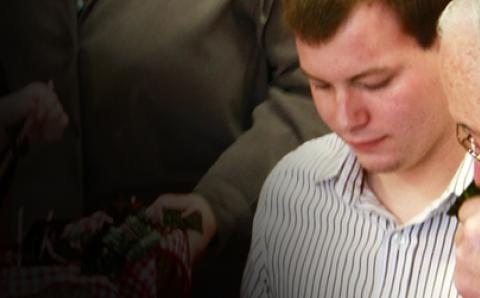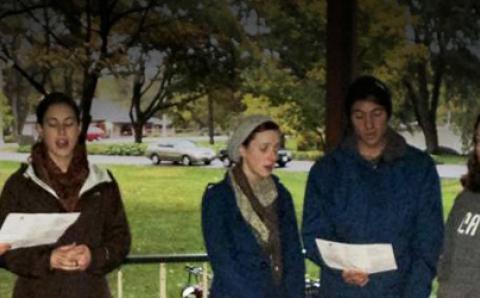As he completed his term on the Ecumenical and Interfaith Relations Committee (EIRC), five of them as chair, Rev. William Koopmans reflected on how ecumenicity has changed in the Christian Reformed Church in recent years.
Rev. William Koopmans: “To have our horizons broadened and our faith stretched and strengthened through people who are different from ourselves, but every bit as much alive in Christ, is marvelous.”
Photo: Karen Huttenga
Koopmans was appointed to the committee in 2006, the year synod revised the CRC’s ecumenical charter—a change that reflected the fact that the CRC is “less insistent than we once were that our partners understand Christian, or even Reformed, truth in the same way as the CRC.”
A more profound change happened when Synod 2010 added to the committee’s mandate, giving it the task of representing the CRC in interfaith dialogue and providing advice and resources to help congregations with that dialogue. “[That change] came because we observed that members of churches are involved in contexts that have interfaith components,” Koopmans said. The committee, which up until then was called the Ecumenical Relations Committee, was renamed the Ecumenical and Interfaith Relations Committee. Koopmans said the church should expect future developments, but that it takes time to lay a foundation for involvement.
Another matter that weighed heavily on the EIRC and the church has been the historic relationship with the Protestant Church in the Netherlands (PCN), a major component of which was, in many ways, the mother church of the Christian Reformed Church. Because of the views held by that denomination, particularly on homosexuality, the CRC severed its formal relationship with that church, with the intent to keep talking.
“There was a de facto cutting of ties,” Koopmans said, “but we’re still seeking to come toward a mutually agreeable memorandum of understanding.”
On a brighter note, Koopmans noted the relationships that have been developed with both the Christian Reformed Church in Haiti and the Presbyterian Church in Canada.
Koopmans noted that another major development occurred when the World Alliance of Reformed Churches and the Reformed Ecumenical Council merged to become the World Communion of Reformed Churches (WCRC).
“We were privileged to be involved in hosting that [gathering] in 2010 and to have a significant role in helping shape the character and identity of this organization,” Koopmans said. He is delighted to have a seven-year appointment to act as an advisor to the executive committee of WCRC.
During much of Koopmans’ tenure on the EIRC, the committee was absorbed with the journey the CRC has taken with the Belhar Confession. “One of the unexpected things was that as the discussion unfolded, an image or silhouette of the church has unfolded,” he said. “That image is one of a denomination that is both deeply committed to finding a way to affirm the principles of unity, reconciliation, and justice, and deeply divided over the precise way that the Belhar will function in moving toward that goal. We run the risk of limiting our ability to express unity when we scrutinize ourselves so closely.”
As he completes his term, Koopmans reflected on a couple of things. He expressed a deep appreciation for his congregation, Grace CRC in Chatham, Ontario, for generously allowing him the time to serve the church in ecumenical matters.
He was also reminded of something Rev. Peter Borgdorff said: that ecumenicity, when it is promoting biblical principles, is both contagious and addictive. “He’s right,” Koopmans said. “It is contagious and addictive. The opportunity to have our horizons broadened and our faith stretched and strengthened through people who are different from ourselves, but every bit as much alive in Christ, is marvelous.”
For continuous Banner coverage of Synod 2012, please follow The Banner on Facebook or @CRCBanner on Twitter. News stories will be posted at www.thebanner.org three times daily. For CRC Communications releases, webcast, and more, please visit www.crcna.org/Synod.
About the Author
Gayla Postma retired as news editor for The Banner in 2020.









